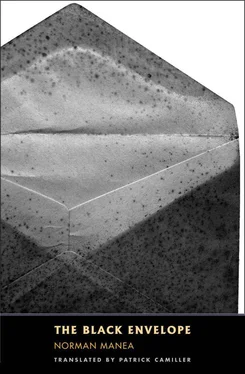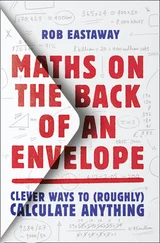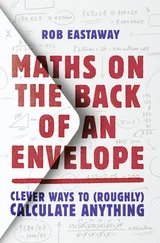An impressive library indeed. Old books in valuable leather bindings, a whole series of French classics, but also famous German and English titles, and, oh yes, a first edition of the Bible in Slavonic. What a miracle that it had not been confiscated in the years of Stalinist hysteria, when he could have landed in big trouble. Tolea advised him to contact Marga. Perhaps a connoisseur of rare objects, but also a possible link to the medical caste where there were still people with money and, who knows? even with soft spots for culture. The lawyer made a gesture of annoyance at the mention of the name. Obviously he knew Marga: they had played poker together for many years. No, he didn’t like the one-eyed doctor’s cautious style of playing. “Only one eye for so many books — just imagine,” muttered the old man, perky with spite. “Not even two young eyes would give you the strength for such wonders.” Tolea did not give up and insisted that Marga was a real possibility, if not to buy it himself, then at least to find someone who would. But the old man suddenly remembered the pills he was supposed to take every evening and hurried toward the kitchen to make some tea. “I’ll make some for you, too. A special tea. It’s a superb Indian tea — really quite special. It works wonders. Sometimes uncomfortable wonders, believe me,” the bibliophile mumbled as he withdrew to the kitchen. While Tolea waited for him to return, he looked at the extra-high walls brimming with exotic golden spines. Then he turned again to the window. The pair was slowly moving into the distance. The noble dog, with its tapering head and its learned locks waving in the breeze of the spring night. And one step behind, its black-mantled companion limped rhythmically along.
The image suddenly shattered. The window shook, thunder hit the walls, everything began to tremble. Tolea jumped sideways in the direction of the door — crash! tray and cups falling to the ground in the kitchen, whoooom! the whole wall with the books tumbling down in a flash, explosion one step away, a miraculous escape, whoooom! one step, one second, the windows clanking and walls tottering, table chair television. The old man was already here, pale, shivering, spasmodically pulling him by the jacket with his bony arms: “Out, out, earthquake.” Already in the shaking front doorway, the walls floor windows people, yes, they had all gone to the doors: shouts, screams, and sobs — with the shell cracking and crumbling, they held on to the door frame, hurled from one side to the other, “like in 1940, an earthquake,” the old man was babbling, and they were lying on the ground and there was no end to it. “Under the door beam, must get under the beam”—the little old man was holding on to the panel of the crackling door; the beams were going crack bang, the floors, the pillars, no end to the swaying, the jabbing. The shell was cracking and tumbling down, this is the long dismal end, hit from one corner to another, frantic dizziness, rocking rocking, no end to it, long long dismal macabre never-ending minutes. Never-ending, never, no, not yet, no, finished, looks like it’s over. “Quick, quick, to the stairs,” murmured the old man. “Wait, let me get my coat, I must just get my coat,” and they grabbed their overcoats and went running running down the stairs strewn with debris and bricks and clothes, to the street, salvation, springing, stirring, stairs, street, yes, in the street, saved, Our Saviour, supreme, saved by Our Saviour supreme, thanks be to Him. Crumpled clothes, deathly pale but alert faces, the street full of victims stamping from cold and excitement, and streets full of rubble and hubble-bubble, columns of bodies and the buzzing of hurried voices, all hurrying here and there without quite knowing where, a kind of mass breakout, as if the disaster had also meant liberation, because it was not possible to return to the shattered cages, now forced at last to rediscover one another, no longer having any shelter, lacking the protection but also the limits of walls, nomadic and free, in the unknown night given back to us. “This is where that little dynamo of a poetess used to live,” said the old man as he pointed to a tall building in ruins. “I was a colleague at the bar with her father. And look at this — it was the perfumery. Now it’s gone, turned into dust.”
They left Sfîntul Ion Nou and went to the university, squashed between waves of people thronging the pavement, beneath flurries of dust raised by the wind from the craters of collapsed buildings. The pensioner stopped in front of the Hotel Ambassador. “There’s no point. I can’t go on. This general hysteria isn’t doing me any good at all.” And the crowd really was on the boil, its gestures and voices irrepressibly accelerating and expanding. The city seemed to be on the eve of a great siege, disturbed still more by the insurrection of its shelterless inhabitants than by the catastrophe that had just struck it. “No, there’s no point; it’s really bad for me. I’d do better to go and look for my sister. At Drumul Taberei, that’s where she lives.” Tolea tried to talk him out of it: it’s late, the buses aren’t running, thieves flood the streets at times like this. But the old man did not give way. He was determined to see what had happened to his sister, because it was quite likely that every one of those socialist-constructed blocks in the new parts of town had come crashing down. “It’s a terrible earthquake, you know. Stronger than the one in ’40. It lasted longer, too. It’s ghastly, really ghastly.” So Tolea went toward Drumul Taberei together with the man who had been his defense lawyer at the trial of his youth.
It was a long way, an hour and a half or so, along unfamiliar streets bustling with a motley and noisy crowd at the peak of overexcitement. The situation did not grow calmer as they moved away from the center. A kind of explosive sleepwalking hypnotized the poor tenants who had been driven from their damaged cells, traumatized by unpredictability and death. Authority had also suddenly disappeared. People were obviously overjoyed that no one was telling them what to do, but they were also stunned, like so many orphans, at not being able to regain their sense of the moment — the only reality, the reborn present at once volatile and voracious, which had to be seized quickly they knew not how, with claws mouth eyes mind, bitten salivated eaten swallowed digested eliminated, get out into the wasteland, that’s all, a moment, an earthquake, we have no right to waste the moment, because soon the sellers and the customs men will be back. “Listen, what are they saying?” murmured the bibliophile, pricking up his ears. “That it hasn’t been broadcast. They still haven’t reported the earthquake on the radio. You see, they already sense the lack of authority. They really should be told what’s happened, and what they have to do.” The old man from yesteryear seemed completely calm and detached, merely adjusting his gold-rimmed spectacles from time to time and giving a pull on his hood, a kind of cone-shaped woolen black stocking. He was breathing with difficulty, it’s true, and his back was bent. But he bore up to the long trek, and despite the shock never lost his good cheer. “Just think: two hours gone by and they still haven’t got the courage to say in public that something has happened beyond their control. Something unavoidable, unpredictable, which challenges their power. The surprises of our Mother Nature! And it does still exist — just think — it’s still capable of springing surprises. The poor officials are suffering from shock. They’re all paralytic, believe you me.” A sign that he was in a special state, however, was that he kept sneezing. Every few minutes he buried his head in the fur lapel of his grand old moth-eaten overcoat. He took from the lapel a large white handkerchief, a kind of napkin, which he then carefully refolded and put back in its place, although it was evident that he would need it again all too soon. “And on top of it all, their boss is out of the country in Africa — just now! I’m telling you, they don’t know how to break the news. They don’t even know how to tell him. Bad news will make him upset — that’s obvious. I don’t envy them, the poor things — they must be scared stiff.” The old man’s voice could be heard faintly beneath the material.
Читать дальше












